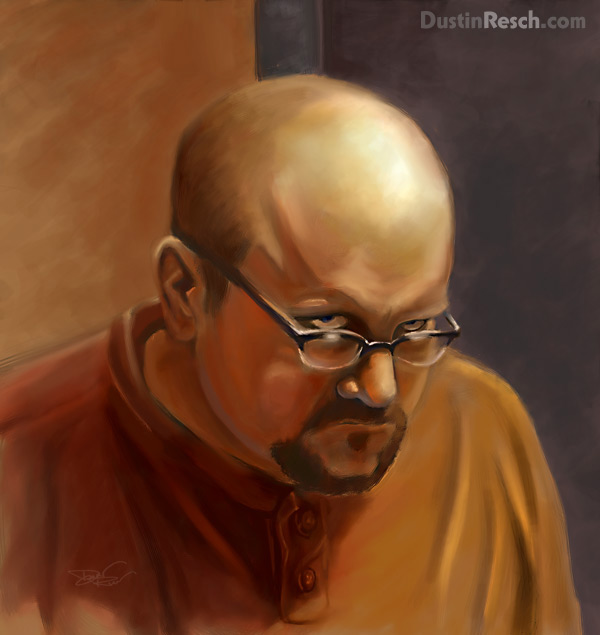Here's more pedantic verbosity about art & stuff.
DISCUSSION #13:
Professor:
A question for this week's discussion: Do you think we are likely ever again to see the level of profound and transcendent quality of painting as embodied by the artists here displayed?
(we were given examples by Vermeer, Van Eyck, and Holbein The Younger)
I look forward to reading your opinions, and answering any questions about the paintings.
Robert
__________________________________________________________
(my response, partially in response to a student who stated "I truly believe that great artists are continually born into this world. The advent of new technologies have through the years increasingly eroded the motivation of artists to create such splendid photo realism. The camera was first such invention to rob a great number of artists of the motivation to create realism." - Ben is one of my most thoughtful classmates, a great guy with whom to discuss ideas)
__________________________________________________________
Me:
It's interesting that you chose "photo realism" to describe paintings that existed long before photography. Or Photoshop, certainly.
I'm sure that it's true, that advances in technology and technique have diluted the mastery available to the world. There are some transcendent and unbelievable artists at work in this day and age, in many media, but imagine how many more artists there are right now than there were when Holbein and Van Eyck were at the top! Just mathematically, given how many more humans are alive in the present day, but also thinking of all of the possibilities for artists in the film and publishing industries, and all of the aspiring amateurs out there on the internet - I feel certain that there are Rembrandts being born every day. Perhaps they will never reach that sort of height though - perhaps all potential is wasted potential in a world where media and distraction and escapism is so readily available. Think of what went into making a Master, in the Renaissance, or the Dutch Golden Age. The years, even decades of apprenticeship and journeyman(ship? ism?), the pigments ground by hand, the sweat and toil and effort.
I want badly to defend my digitalism here, but I can't deny the truth of the idea that it's just not the same as squinting into the sun, turpentine poisoning the blood of my fingers, trying to force the canvas to yield light and form and mass through sheer effort of will. It's not the same when you can publish your fumblings to thousands of people in seconds, and have dozens of them press "like" and you're instantly validated. None of us will know what it's like to be denied entrance into L'Academie, or to earn the displeasure of the Pope, or to be beaten with a stick by Roberto da Florczak for mixing the lapis lazuli with the wrong amount of linseed. I know how hard I've had to work to force art into my head and my hands, being a person born for words and numbers and facts, but I know it's nothing like as hard as becoming one of the Masters of old. Those guys didn't have online tutorials, or how-to books, or the extra centuries of art to study. The difficulty makes the mastery, to some degree.
With all that said (and realizing I should have quit there, to avoid being beaten with a stick), I also want to mention, though, that potential need know no ceiling. New generations of artists, if they can learn that their position is one of precarious balance upon the shoulders of giants, can build upon the wealth of available knowledge. They can take inspiration from previous perspiration. Old things can be combined and dissected into new things. I don't like to think that we peaked as a species with the Industrial Revolution, or that artists can never, ever make art as important or beautiful as the fine gentlemen of the past again. It's a different world, to be sure - and most of us will become "masters" for the price of a student loan, without ever paying the price of calloused fingers that came from tearing Art for the first time from the raw firmament of the cosmos. I get a pretty sore neck from bending over my Wacom tablet, but hardly anyone ever whips me when I forget to let the canvas dry properly before I lay down a new glaze. I share the nostalgia of the way things were before Digital Man diluted everything, but I wash it away with the hope that a progressing species will find new ways to transcend.
skip to main |
skip to sidebar

All original artwork is licensed under a
Creative Commons Attribution-Noncommercial-No Derivative Works 3.0 Unported License.
 Posts
Posts

 Posts
Posts
character design | story art | digital illustration
Search This Blog
Facebook Fans
DustinResch.com Drawings & Stuff on Facebook
View Demo Reel
Who the Hell?
Artwork Protected
All original artwork is licensed under a
Creative Commons Attribution-Noncommercial-No Derivative Works 3.0 Unported License.
Subscribe Via RSS






No comments:
Post a Comment